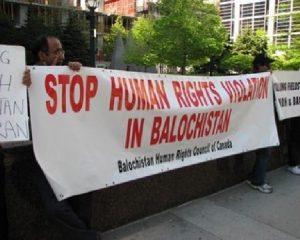 The US Congress held a hearing on Balochistan this week. If this seems strange, that’s because it is. The US holding hearings on Balochistan seems rather like the National Assembly holding hearings on racism and human rights violations in the US – the right issue, but the wrong forum. After all, what do American Congressmen know about the situation in Balochistan? Isn’t it possible that they could be manipulated and actually make things worse? The Foreign Office has taken notice of the hearing and Foreign Office Spokesman Abdul Basit told the media that “Our concerns have been forcefully conveyed in Washington”. But while concerns are conveyed about hearings on Baluchistan being held in Washington, we should also be expressing concerns that so little attention is being paid in Islamabad.
The US Congress held a hearing on Balochistan this week. If this seems strange, that’s because it is. The US holding hearings on Balochistan seems rather like the National Assembly holding hearings on racism and human rights violations in the US – the right issue, but the wrong forum. After all, what do American Congressmen know about the situation in Balochistan? Isn’t it possible that they could be manipulated and actually make things worse? The Foreign Office has taken notice of the hearing and Foreign Office Spokesman Abdul Basit told the media that “Our concerns have been forcefully conveyed in Washington”. But while concerns are conveyed about hearings on Baluchistan being held in Washington, we should also be expressing concerns that so little attention is being paid in Islamabad.
The day before the American hearing, an informal debate on Balochistan situation took place at the National Assembly, and several MNAs gave passionate statements about the situation.
“A volcano is active in Balochistan and can explode anytime,” warned Gul Mohammad Jhakrani, a ruling Pakistan People’s Party (PPP) lawmaker who was of the view that Balochistan had been ruled by the Inspector General Frontier Constabulary instead of civilian government.
“The FC is the ‘de facto master’ of Balochistan while on the contrary the chief minister seems helpless to control the provincial affairs,” he said, adding that ‘some elements’ were deliberately creating law and order situation in the province which he warned might create another “Bangladesh” if problems of Baloch people were not addressed seriously.
Unfortunately, attendance at this important discussion was disturbingly low. Only 54 members were present at the start and the number was reduced to 48 when the sitting was adjourned. This is turning a blind eye to an important issue of national security.
Watching the online video of the American hearing on Balochistan, I was not surprised by comments that seemed, well, crazy. This is to be expected. What struck me was seeing the attendance at the event. In addition to the American Congressmen present on the panel, there were no less than five official speakers who were allowed to give statements including Christine Fair (who I have criticised in the past but actually gave one of the more thoughtful statements) and Pakistan Director Human Rights Watch Ali Dayan Hasan.
When the cameras showed the speakers, I could see behind them a room filled with Pakistani faces. This made me think, why should we have to go to Washington to have an open discussion about such important issues at home.
Amnesty International has released a new report highlighting the danger of ignoring the growing security threat in Balochistan. As their report notes, this is not a one-sided security threat but the combination of military abuses, armed Baloch groups targeting civilians, militant groups, sectarian groups, and criminal gangs.
“Balochistan is one of the most militarised regions of Pakistan, with the military, paramilitary Frontier Corp and levies, and police stationed across this vast province,” the Amnesty briefing said. “Despite this presence, or perhaps because of it, Balochistan is one of the most dangerous parts of Pakistan, with armed groups affiliated with the state, sectarian armed groups, armed groups hostile to the state, and criminal gangs operating with near complete impunity,” noted the briefing paper.
It warned that the province is “gradually heading to a state of perpetual conflict that threatens stability not only in Pakistan but also in the neighbouring countries of Afghanistan and Iran, and throughout the region”.
Just as the threat is internal, though, so is the solution. By raising the issue in National Assembly, MNAs like Gul Mohammad Jhakrani, Humayun Aziz Kurd, Farahnaz Ispahani, and Abdul Qadir Baloch are leading the way towards peace.
Pakistan researcher at Amnesty International Mustafa Qadri Tweeted on Wednesday, ‘International attention of Balochistan is welcome but must not be used for selfish point scoring. This is a matter of justice not politics.’ It should be noted that the MNAs who addressed the issue in parliament were from coalition and opposition parties also. Human rights is not a political issue. Neither should the situation in Balochistan be considered one.
![]()






[…] […]